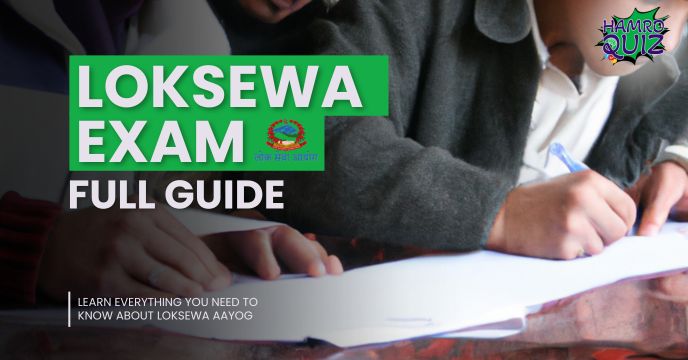
Comprehensive Loksewa Aayog Guide - Nepal (2024)
Firstly, Let's learn what is Loksewa Aayog?
Loksewa Aayog also known as the Public Service Commission (PSC) was established right after the establishment of Democracy in 2007. It was established in Asad 1, 2008 B.S. (June 15, 1951 A.D.) to ensure fair and transparent recruitment of candidates for civil service posts. It is the trusted source of employment for many Nepalese seeking stable careers.
Over the years, Loksewa Aayog has evolved into a main institution that extends beyond mere recruitment, encompassing the development and maintenance of professional civil service. Part 23 of the Constitution of Nepal has provided a place for the Public Service Commission where it is mentioned that they will be conducting the written examination for filling the posts of Civil Service, Nepal Police, Armed Police Force, Nepal, and other federal government services.
What Duties, Responsibilities, and Rights are held by Loksewa Aayog?
Under Article. 243 of the Constitution of Nepal, The Public Service Commission is required to conduct a written examination through which the suitable candidate for the position in the government sector is appointed. Also, the word civil service post comprises Nepal Police, Armed Police Force, and Nepal Army.
There are other duties and responsibilities of the Public Service Commission where there is a need to consult for the following matters:
- About the guidelines for the appointment, promotion, and departmental action in the federal civil service or posts
- About the rules for the promotion to posts in the Nepal Army, Nepal Police, Armed Police Force, Nepal and other federal government services;
- Regarding the appointment of applicants for positions in the Federal Civil Service for a period exceeding six months,
- Regarding the transfer or promotion of Federal Civil Service to another, or from other government services to Federal Civil Services or from Federal Civil Service to State Civil Service Subject.
- Regarding the permanent transfer or promotion of employees from a position that doesn't require Public Service Commission participation to one that does;
- About the departmental punishments issued on Federal Civil Service employees.
After learning about Loksewa Aayog, let's learn what is Loksewa Examination?
If you're looking for a government job, a common search keyword for prospective civil workers is Loksewa. It is an unbiased and open examination that guarantees meritocracy in the public sector conducted by Loksewa Aayog (The Public Service Commission). It is a reliable employment option for many Nepalese looking for long-term employment. The competitive exam is the foundation of Lok Sewa's hiring procedure. The exam is broken up into multiple phases, including the main exam, interview, and preliminary rounds, carefully assessing the abilities, knowledge, and skills of applicants. The curriculum covers a wide range of topics, including general knowledge, current events, the Nepali language, and questions relating to the post being applied for.
How is the Loksewa exam conducted?
Under the Act,2066, The Public Service Commission will select appropriate candidates through one or more of the following methods:
- Written examination
- Practical Examination
- Interview
- Other methods prescribed by the Commission
The Public Service Commission determines the number of positions to be filled by the applicable rules and regulations upon receiving the request from the concerned department to fill the vacant job. Weekly bulletins will be issued every Wednesday and the commission will publish the advertisements in the Gorkhapatra National Daily following the determination of the post count. Applications will be accepted within 21 days after the published advertisement and an additional 7 days for taking an open internal competitive examination.
After that, the Commission's regional directorate, zonal office, and application management center receive online applications for the advertised vacancy following the publication of the advertisement for the open and internal competitive examination. Candidates are given admit cards to appear in the exam after carefully reviewing the application.
To complete the mentioned tasks, experts in the field will be brought to prepare the question papers needed for examining the relevant group and post. The question paper set will be received confidentially. At least five sets of practice questions will be prepared by other experts in the same area of study. Each set will be assigned a special signal number. The Honourable Chairman of the Commission will select a set of question papers chosen based on the special signal number and that set of questions will be used for the examination.
Exams are conducted with a high level of confidentiality as answer sheets are double-checked using secret codes; after the exam paper is assessed for the first time, a code is given and it is sent to a different branch with a different code; after receiving the answer sheet following the second code, it is again sent to experts in the fields designated by the Honourable Chairman for testing.
The results are published after the codes are decoded and tallied. Following the disclosure of the results, the candidates are offered a date for an interview with a field expert. Each expert will give scores separately to maintain secrecy. The scores are shown only at the time of the candidate merit order and recommendation. The interviewer will also not be aware of the scores each student received on their written exam.
The Public Service Commission has been constantly upgrading its team of experts and specialists for commission tasks, including developing curriculum, conducting psychological personality tests, interviewing candidates, reviewing and preparing question papers, and reviewing answer guides. They secretly appoint the experts for a certain kind of screening job. Screening tests are conducted for certain positions and only those who pass the initial screening test will be eligible to take the main exam.
There is a provision for recommending applicants for appointment to the relevant office only in the case of published jobs, to the body conducting such service following the final selection of candidates from the open competition. One copy of the concerned candidate's application form and copies of the certifications they supplied should be sent with the letter of recommendation when it is sent to the proper authority for appointment.
The steps mentioned above are followed when it comes to security agencies, government services, and organized organizations, from determining the percentage to carrying out the written exam.
The Pattern of Loksewa Examination
There are two written parts and one practical/interview phase in the Loksewa civil service exam. Your education, practical skills, and interpersonal skills are all going to be evaluated during these phases. To be considered for eligibility for admission, you must score highly in every section.
Test Type 1
- Part 1
The applicants' general knowledge will be evaluated in this test. The test will consist of 50 multiple-choice questions (MCQs), with two marks for each right answer. The MCQs take 45 minutes to complete, and a score of 40 out of 100 is required to qualify. Only those who pass this phase with a good score are eligible to move on to the second stage.
- Parts 2 and 3
Both your general knowledge of current events and your area of expertise will be tested. There are two papers in this phase, each having a total score of 100 and a passing mark of 40. Only those who make it past this stage are qualified to move on to the interview and practical phases.
Test Type 2
This is the Loksewa test for current research and public service management. There will be discussion on social issues, national security, and other topics of public interest. It is crucial to understand the service industry, regardless of your field of study. There are going to be 14 short questions (5 marks each) and 3 larger questions (10 marks each). You have two hours and thirty minutes to complete this paper.
Test Type 3
This is the service group's Loksewa test. There are five branches from which one can select: judicial, foreign affairs, parliamentary, administrative, and accounts. This paper will include several subjective questions about those industries. 40 points out of 100 is a passing mark. Because of the competition, you will need to score much above the minimum requirements to be selected.
Tips for Preparing for Loksewa
It takes dedication, determination, and preparation to prepare for the Lok Sewa exams. The following advice will help you prepare better. Here are some tips to enhance your preparation:
- Know the Syllabus: Learn more about the format and topics included in the tests for the position you have selected.
- Make a Study Plan: Set up a timetable so that each subject has enough time to be covered, including extra time for practice and evaluation.
- Collect Relevant Materials: It is recommended to gather relevant study materials, such as textbooks and past exam questions from trustworthy publishers, give mock exams, and consult coaching facilities for assistance.
- Practice Often: While taking mock exams, solve past exam problems regularly to evaluate your level of preparation.
- Stay Updated: To perform well in the general knowledge section of the test, which is commonly asked, keep up with current events, policy changes, and national and worldwide events. Keep yourself updated by following news channels and reading newspapers.
- Seek Guidance: Especially for the Lok Sewa exams, think about enrolling in reliable tutoring programs or checking out websites that offer study guides and assistance.
Practice Quizzes for the Loksewa Aayog Examination
We have provided some loksewa quizzes that might be helpful for those students who are preparing for the exams or getting themselves ready. This quiz section offers a general idea for students about what type of questions might be asked during their loksewa exams.
- धुम्रकेतु प्रत्येक कति वर्षपछि देखिन्छ ?
- Home of man' भनी कुन महादेशलाई चिनिन्छ ?
- रारा तालको पानीबाट कुन खोला बनेको छ ?
- रानी पोखरीको उत्तर–पूर्व र उत्तर – पश्चिम कुनामा भैरव, दक्षिण–पूर्व, कुनामा महालक्ष्मी र दक्षिण–पश्चिम कुनामा केको स्थापना गरिएको छ ?
- तीनतिरबाट नदीले सिमाना छुटाएको जिल्ला कुन हो ?
- काठमाण्डौको सबैभन्दा नजिकको दूरीमा रहेको अन्तराष्ट्रिय राजधानी कुन हो ?
For more quizzes related to the Loksewa exam, log in to HamroQuiz
Conclusion:
The Loksewa examination in Nepal offers a path toward a rewarding career in public service that emphasizes honesty, responsibility, and dedication to the well-being of the country and its citizens. By accepting the challenges presented by the Lok Sewa examinations and using a disciplined preparation strategy, candidates can start a transforming path towards achieving their goals and making a significant contribution to the development and economic success of Nepal.
Frequently Asked Questions (FAQs)
- How to fill Loksewa form?
- Who is eligible to appear for Loksewa?
- To take the Lok Sewa Aayog Examination, you must be a citizen of Nepal and meet the requirements listed below:
- Must be a Nepali Citizen with valid Nepali Citizenship
- For non-gazetted jobs, the minimum loksewa aayog age limit in Nepal is 18, and for gazetted levels, it is 21.
- The maximum age limit for men is 35 and the maximum age limit for women and physically challenged people is 40.
- SEE/SLC is required for Kharidar's position, an intermediate degree is needed for Nayab Subba, and a bachelor's degree is needed for a Section Officer.
- They must not have been fired from government employment previously.
- Must not be found guilty in any criminal matter involving ethical misconduct
- How to pay Lok Sewa bill Online?
- Online bill payment for Loksewa is simple and hassle-free. Simply click the provided link to view the video. How to Pay Loksewa Aayog Exam Application Fee Online
"Good Luck to everyone appearing for the Loksewa Examination. Stay focused, stay confident, and trust in your abilities. You've got this!"
